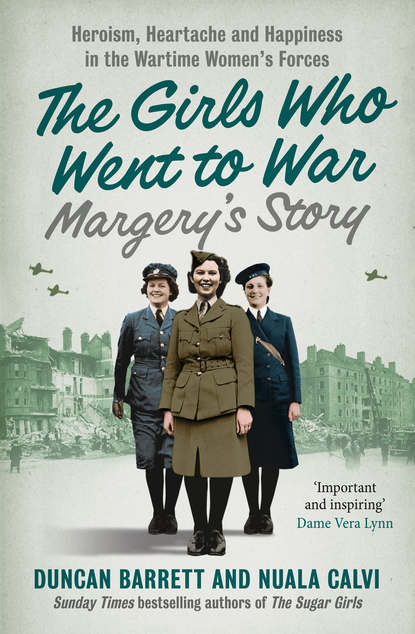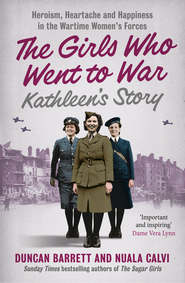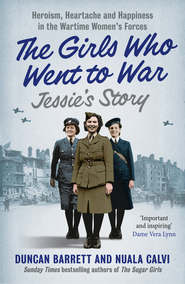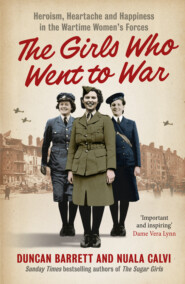По всем вопросам обращайтесь на: info@litportal.ru
(©) 2003-2024.
✖
Margery’s Story: Heroism, heartache and happiness in the wartime women’s forces
Настройки чтения
Размер шрифта
Высота строк
Поля
Margery had never felt like a pretty girl herself, but she couldn’t help feeling sorry for poor Oriole. Not only had she been lumbered with the name of a seafaring vessel, but she had a face that would struggle to launch a gravy boat, let alone a thousand ships.
With her clipped vowels and naval connections, Oriole seemed like the kind of girl who should have been in the WNRS rather than the WAAF. But Margery appreciated having someone to pass the time with before she was allowed to return to Mrs Poole’s for her evening meal. More than 150 miles away from her home in North Wallington, and with no older sister to look out for her, she had begun to feel terribly lonely.
It was Oriole who first introduced Margery to the delights of the local NAAFI – the Navy, Army and Air Force Institute. The NAAFI canteens and shops were becoming an increasingly familiar sight across Britain, offering forces personnel of the lower ranks a place to get cheap food and a hot drink. At last Margery had a place to go for a nice cup of tea once her classes finished, rather than traipsing along the seafront in the rain.
One day, Margery was sitting in the NAAFI with Oriole after a long and dreary afternoon in the classroom when an Army chap took a seat on the bench opposite them. As he warmed his hands over a steaming mug of coffee, he asked her, ‘Got any ciggie coupons, love?’
Margery looked up, startled. She and her friend didn’t usually attract the attention of the servicemen.
The man was a good ten years older than her, of medium build, with dark hair. There wasn’t much that was remarkable about him, except for a strong Lancashire accent, but he had a friendly face and that was something Margery was sorely missing.
‘I think I might have – hold on a minute,’ she said, rummaging in her pockets until she found her cigarette ration card. Since she didn’t smoke, she was happy to hand it over.
‘Don’t you want anything in return?’ the man asked, surprised.
‘Oh no, it’s all right,’ Margery told him.
‘Aw, go on,’ he pushed her. ‘How about a nice choccy coupon? That’d be a fair swap, wouldn’t it?’
Margery smiled shyly. ‘Yes, please,’ she said, taking the chocolate coupon gratefully.
The man seemed to interpret their little transaction as permission to stop and chat. Before long he had introduced himself as James Preston and was nattering away about the Army catering course he was doing in Penarth. He had an easy, Northern warmth, and Margery suspected that he, too, must be lonely and just keen to find someone to talk to while he was so far away from home.
Usually Margery kept on eye on the clock until 6 p.m. every evening, when she and Oriole were permitted to return home, so it came as a surprise when her friend pointed out that they were in danger of being late for dinner. ‘Better get moving, old thing,’ Oriole told her cheerfully. ‘Mrs Poole’s potato cakes wait for no woman!’
But before Oriole could drag her away from the NAAFI, Margery had agreed to meet James for coffee there the following day – and soon the afternoon chats had turned into a regular arrangement. For the first time since she had arrived in Penarth, Margery had begun to feel less cut adrift. All day long, as she studied the relentless lists of items and their numbers, she looked forward to the time she would be spending in the NAAFI with James.
With the end of Margery’s course looming, the need to study only increased, as she became more and more anxious that she might fail the dreaded test. Night after night, she went over the long list of forms and parts until her eyes were swimming with numbers. But the thought of having to write home and admit to her family that she had fallen at the first hurdle in the WAAF, and imagine them laughing at her ambitions again, was unbearable.
Finally, the dreaded day arrived, and Margery and the 60 other girls who had trained alongside her turned over their exam papers. She summoned all her brain power to the task of recalling as many of the wretched forms and parts as she could, as well as the various processes and procedures she had learned. But by the time she reached the final page of the exam, she had only been able to answer less than half of the questions.
The following day, the girls were ordered to line up in alphabetical order on the seafront. One by one, their surnames were called out, and their results were read off in front of everyone. Margery cringed as a good few of the As, Bs and Cs in the group were told that they had failed to reach even the remarkably low pass mark of 40 per cent. It was an agonising wait until the sergeant finally made it down to the letter P. ‘Pott,’ she barked, ‘40 per cent exactly. Pass.’
Margery blinked her eyes in the early morning sunlight. She couldn’t believe it – somehow, she had succeeded where so many others had failed. Despite her terrible memory and her crippling nerves, she had scraped through.
The poor girls who hadn’t been so lucky soon heard their fates. One of them was furious when she found out she was being sent to train as a cook. ‘I wanted to be in accounts!’ she cried miserably. But it was no use – once the Air Force had made up its mind, the decision was final.
Meanwhile, the girls who had passed the test were marched off for a series of inoculations. Feeling heady after her unexpected victory, and exhausted from the stress of the past few weeks, Margery fainted before she even saw the needle.
The next day, the girls were issued with railway warrants to take them home, so that they could spend a bit of time with their families before they had to report to their new postings. Margery was sorry to say goodbye to James Preston, but he had taken her service number and promised that he would write. The two months she had spent in the WAAF was the longest she had ever been away from home, and she felt desperate to get back to North Wallington again.
After a long train journey, Margery walked up the lane to the old maltster’s house, carrying her grey kitbag over her shoulders. The neighbours came out of their houses to get a look at her in her uniform, and when her parents opened the door she could see a glimmer of pride in their eyes.
Margery felt proud of herself too, she realised with a start. Nobody was laughing at her now.
Chapter 2 (#u8aaa7c09-2387-552f-aee1-6640eb681753)
Having passed the dreaded test in equipment accounts, Margery waited anxiously for her posting to come through, wondering where on earth she would end up. By now, the Air Force had women working at stations the length and breadth of the land, from Cornwall to the Outer Hebrides. Some girls were serving as far afield as New York and Washington DC, while a small team of radio operators were about to set off for a post in Cairo.
But as it turned out, Margery’s new workplace was distinctly unexotic. She was ordered to report to RAF Titchfield, just four miles down the road from her home in North Wallington – so near, in fact, that she was expected to make her own way there, without any assistance from the Air Force.
It was a scorching summer’s day, and by the time Margery arrived at the camp, struggling under the weight of her heavy kitbag and clutching her respirator and helmet, her blue uniform was soaked with sweat and she was looking distinctly dishevelled. A guard on the gate glared at her before asking dismissively, ‘What are you, one of the new cooks?’
‘No,’ replied Margery, blushing. ‘I’m here for Equipment Accounts.’
When he heard the last word, the guard’s attitude seemed to change a little. ‘Name and number?’ he asked, slightly more civilly.
‘Pott, 294,’ replied Margery.
The man stared at her, a smile playing at the corners of his mouth. ‘Say that again, would you?’ he asked.
‘Pott, 294,’ she repeated.
The man turned to a fellow by his side and bellowed, ‘Sergeant, this woman is being rude to me!’ Then the two of them burst out laughing.
All her life, Margery had put up with jokes about her name, but the endless repetition hadn’t served to make it any easier. She wasn’t one to answer back, and in any case she wouldn’t dare to confront a guard, so she stood patiently, wiping the sweat from her brow, until finally the laughter died down.
The guard, whose face was by now as red as Margery’s, ushered her through the gate, and soon a WAAF sergeant came to collect her. ‘You can drop your kitbag in the dormitory hut,’ she told her, ‘and then I’ll show you to the office.’
Margery followed the other woman to a large wooden hut, similar to the one she had slept in during her initial training at Innsworth. There were 30 metal beds arranged along the two sides, with double lockers in between them. She left her things on an empty bed and then followed the WAAF sergeant back outside.
On her way to Equipment Accounts, Margery got her first proper look at the camp that was to be her home for the foreseeable future. It was a large site, where several hundred men and women worked side by side in seemingly endless rows of wooden huts. There were residential huts for the airmen and WAAFs who lived on the base, offices for administration and pay accounts, the camp police station and armoury, and a series of large mess buildings, with separate huts for officers, NCOs and other ranks. To Margery it seemed like an entire wooden city.
The Equipment Accounts office looked out over a wide parade ground, on the other side of which was the most striking feature of the camp: four giant aircraft hangars. RAF Titchfield was a maintenance station for Number 12 Balloon Centre, employed when the enormous inflatables, which were sent up from various sites in the area to disrupt low-flying German bombers, required repairs. In the vast hangars at Titchfield the fabric of the balloons would be checked for tears and stitched up by WAAFs handy with a sewing machine, before they were painted with three coats of silver ‘dope’ to prevent any hydrogen gas from leaking out. The girls charged with this unpleasant task spent their days inhaling the noxious fumes from the paint, and were given a special ration of milk as compensation.
The camp was also a training site for balloon-operating teams, and in a field off to one side Margery could see one of the huge inflatables being filled with gas. Lying on its side on the grass, it looked like a giant beached whale, but as Margery watched, the crumpled surface began to ripple and grow taut, until the magnificent 60-foot balloon slowly started to rise off the ground.
Although girls had been hard at work maintaining the balloons since the Battle of Britain, it was only recently that the WAAF had agreed to try out all-female teams to actually fly them. These ‘Young Amazons’, as they were known unofficially, were chosen for their physical strength – their training involved weight-lifting, as well as mastering the inflation procedure, splicing the ropes that held the balloons down and operating the winches that kept them anchored. The girls worked in teams of 12, whereas it was seven for all-male groups, but it was a tough job and many women ended up hospitalised with ruptured stomachs.
Compared to the work of the balloon girls, Margery’s job in Equipment Accounts was pretty low-risk, and the heaviest lifting she would have to do was heaving ledgers around the office. But that didn’t make her feel any less nervous as the WAAF sergeant led her up to the door.
She entered to find half a dozen young women, along with a handful of men, nattering away at their desks almost as if they were in a mess hall, not an office. For a moment, Margery was a little taken aback. This wasn’t the strict Air Force atmosphere she had grown used to during her training.
A male flight sergeant stood up and approached her. He was an ugly-looking fellow in his mid-thirties, tall and thin with dark hair. ‘Oh, you must be the girl from the course,’ he sneered. ‘I suppose you’re here to show us all how it’s done.’
Margery didn’t quite know how to respond to that. She nodded awkwardly and allowed herself to be led over to an empty desk, where she began familiarising herself with the ledgers she would be working on.
The job of Equipment Accounts was to keep track of things ordered from the camp stores – everything from cups and saucers to guns and ammunition. But it wasn’t long before Margery realised that her new colleagues had very little understanding of the procedures they were meant to follow. Since none of them had gone through the official training course, they had got used to muddling through with a mixture of common sense and improvisation.
Each item ordered at Titchfield would be registered on a form and signed by the officer responsible, but as Margery flicked through the paperwork, she began to notice a number of strange irregularities. Many of the forms in her ledger had been marked up with unfamiliar acronyms, ‘NIV’ and ‘OI’. Had she missed something in her accounts training, she wondered.
Nervously, Margery went up to the flight sergeant’s desk. ‘What do the letters NIV mean?’ she asked him.
‘Not in vocab,’ the man replied dismissively.
Margery was puzzled. She knew that every item, even down to the tiniest nut or screw, had a vocab number, which was supposed to be used on all paperwork. The idea of an item not being in vocab went against everything she had learned during her training. ‘What about OI?’ she asked, anxiously.
‘Over-issued,’ replied the flight sergeant, without looking up from his own work.











